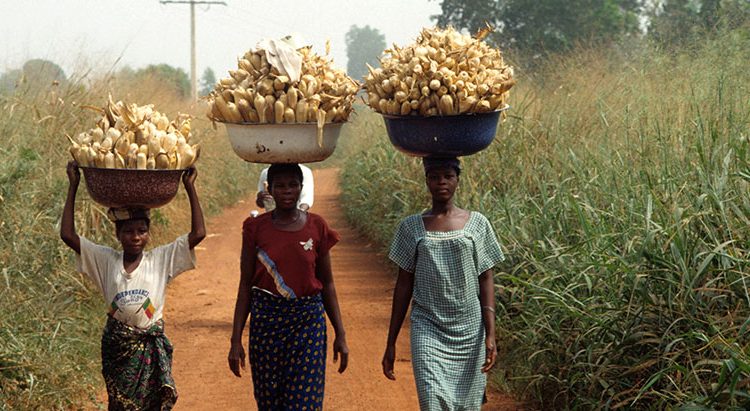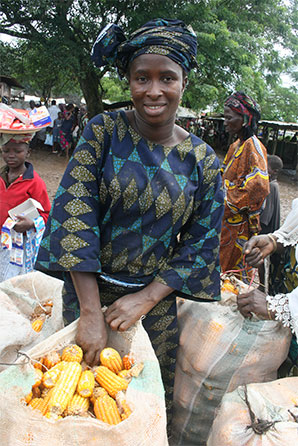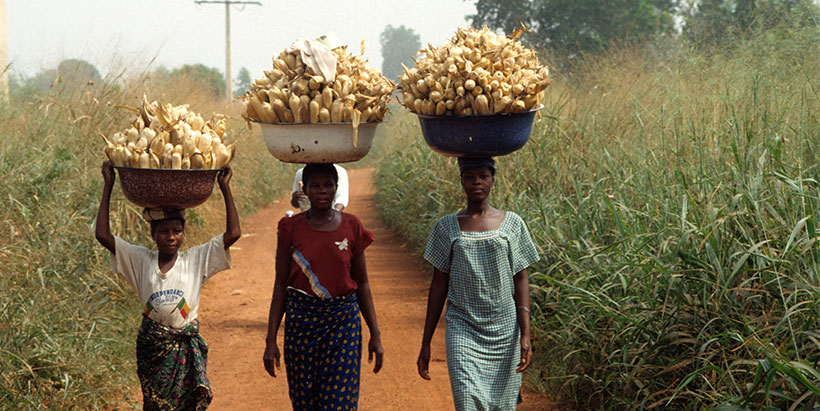
Researchers call for gender-inclusive crop varieties to aid food security
The global population is rapidly increasing and there is need for increase in global food production to meet the needs of the growing population. Although maize is one of the most important and widely cultivated staple crop in Sub-Saharan Africa, yields have been significantly low in many countries. However, research has shown that gender has significant impacts on agricultural activities. One of the reasons being that men and women have unequal access to and control over key productive resources upon which agriculture depends. Gender differences also affect how crops are utilized in postharvest food processing and marketing and how these are valued by different consumer groups.
A study was carried out by a team of researchers led by Amare Tegbaru, an IITA Gender Specialist as at the time the work was done, to examine the development of drought/ tolerant maize varieties in West Africa. The study was done using gender-disaggregated data recorded during participatory on-farm maize trials by the Stress Tolerant Maize for Africa Project. The trials were conducted in agroecological zones of Benin, Mali and Nigeria to identify men and women farmer’s expressed varietal and trait preferences in order to evaluate plant breeding strategy. It employed farmers’ responses to varietal and trait preference. Results of the analyses will help to identify specific gender preferred characteristics that relate to postharvest, nutritional and processing qualities with implications for future breeding of maize varieties appropriate for both male and female farmers.
In each country, the team employed a standardized and harmonized semi-structured individual interviews and focus group discussions to collect on-farm trial data such as gender differentiated perceptions of the varieties, preferences of traits, and other consumer-based characteristics related to postharvest uses and benefits. The study was done in three stages with Stage I focusing on farmers identifying their first and second most preferred varieties. In Stage II, the first, second and third most important preferred traits of participating men and women farmers were selected. For Stage III, a summary of key preferred traits and postharvest and food processing characteristics that should be considered for breeding for the gender-focused product pipeline development in the future was presented.
In Nigeria, the top three ranked characteristics include drought tolerance, grain yield and its related characteristics, maturity cycle, characteristics associated with consumption and animal feed as well as marketing. Income and food security characteristics dominated the Nigerian preference summary. In Benin, the top ranked characteristics were drought tolerance, yield and its related characteristics, maturity cycle, characteristics associated with consumption, animal feed and fuel. The Benin trait summary primarily addresses food security. The most preferred characteristics in Mali include drought tolerance, ease of harvesting, yield and its related characteristics, maturity cycles, characteristics associated with animal feed and fuel. The selected characteristics highlighted the importance of food security, use of labour at harvest time and the raising of domestic animals in producers’ communities.
 The final stage of the analysis summarised the preferred characteristics associated with the selected varieties by men and women farmers in the study countries. The top three ranked characteristics are associated with drought tolerance, grain yield and its related characteristics, maturity cycles, characteristics associated with animal feed and fuel. The selected characteristics emphasised the importance of food security, use of labour at harvest time and the raising of domestic animals in producers’ communities. The fact that both men and women farmers preferred the same varieties and hybrids in our study provides private seed companies with an opportunity to market the same product to farming communities for both production and home consumption.
The final stage of the analysis summarised the preferred characteristics associated with the selected varieties by men and women farmers in the study countries. The top three ranked characteristics are associated with drought tolerance, grain yield and its related characteristics, maturity cycles, characteristics associated with animal feed and fuel. The selected characteristics emphasised the importance of food security, use of labour at harvest time and the raising of domestic animals in producers’ communities. The fact that both men and women farmers preferred the same varieties and hybrids in our study provides private seed companies with an opportunity to market the same product to farming communities for both production and home consumption.
Consequently, the study revealed that unravelling the underlying factors influencing varietal preferences by men and women farmers may help develop better breeding strategies that permit the development of gender-response products with greater potential impact on livelihoods in farming households.
“One of the lessons drawn from this research is the need to make an adjustment in breeding coupled with effective collaboration with food science and postharvest specialists as well as private seed companies on the packaging of technologies to reach both men and women farmers, and other value chain actors,” said Tegbaru. “Our breeding product pipelines for the different product profiles will therefore be refined by adding traits preferred by women farmers,” added Abebe Menkir, IITA Maize Breeder and a member of the research team.

